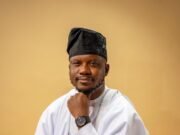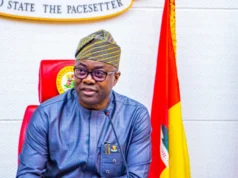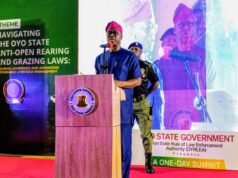Staff of the First Technical University, Ibadan, have won three significant research grants, all worth of over four hundred and fifty thousand Euros (€450,000).
This was revealed by the Vice-Chanor of the institution, Prof. Ayobami Salami during an occasional lecture held in the school premises on Monday.
“Dr Olumide Ajibola, a Senior Lecturer in Microbiology at the university, has been awarded a career development grant of €149,775 under the European and Developing Countries Clinical Trials Partnership (EDCTP2).
“The grant, which was awarded for a 30-month research, titled Role of Schistosomiasis in Dysbiosis, Inflammation and Bacterial Translocation in children from Nigeria, will explore dysbiosis and inflammation of the gut by Schistosomiasis and how it promotes translocation of Salmonella into the blood. Schistosoma infections are most prevalent and intense in children due to lack of hygiene practices, access to clean water, and poor health care facilities in affected countries such as Nigeria.
“Dr. Ajibola is also a recipient of a few travel awards and the Royal Society of Hygiene and Tropical Medicine small grant.
“Similarly, Tech-U is the Nigeria partner in a multi-country £150,000 Arts and Humanities Research Council (AHRC) grant for a research on the experiences of, perspectives on, and responses to COVID-19 in the Sub-Saharan Africa. The project is titled: Whose crisis? The global COVID-19 crisis from the perspective of communities in Africa. This AHRC project addresses the UN Sustainable Development Goals 1, 3 and 17, in particular in Uganda, Malawi, Eswatini, Nigeria and Bostwana, with implications for broader impact across Africa and the Global South.
“Whose crisis”? is an urgent response to a rapidly evolving global health pandemic whereby the Global North is leading (by example and economic pressure) a response to an emergency affecting communities all over the world.
“The dominant discourses on COVID-19 are generated in the North, overwhelmingly by a minority of wealthy and powerful authors, reflecting on a crisis that, while impacting the whole world, is experienced in vastly different ways. The project positions the Southern country partners centrally as agents of change within the volatile environment of the COVID-19 crisis.
“The First Technical University is also a member of a consortium of universities and several industry partners implementing the £155,464 Project titled Artificial Intelligence for Clean Energy (AI4CE) Development, which is a Higher Education Partnerships in Sub-Saharan Africa (HEPSSA) Contract being funded by the UK’s Royal Academy of Engineering. The aim of the project is to develop innovative approaches to clean energy generation using AI and at the same time rely on Information and Communication Technology (ICT) for integrating the clean energy to the existing grid system by turning academic ideas into businesses through AcadoPreneurship.
“AI4CE would put in place programmes capable of raising national and regional scientists, researchers, students, entrepreneurs and power utility product developers through the introduction of ICT enabled blended experiential learning model,”the VC said.
He also noted that the positive development was an indication of the quality of minds and research efforts at the university, despite its age.
According to him, a university must be a problem solver, beyond producing graduates who are expected to inspire and effect development in society, hence, the University trains her students not only to think out of he box, but to think without the box.
“Right from the commencement of academic activities in January 2018, the First Technical University (Tech-U), has placed premium emphasis on scholarship and research. We encourage and demand from our faculties, a proactive response to the growth and challenges of humanity. We see the projects that have attracted these three grants as a fruit of this desire which we have been vigorously pursuing despite all odds, and we really appreciate the funders for their timely intervention. We pledge our commitment not rest on our oars,” he added.

































